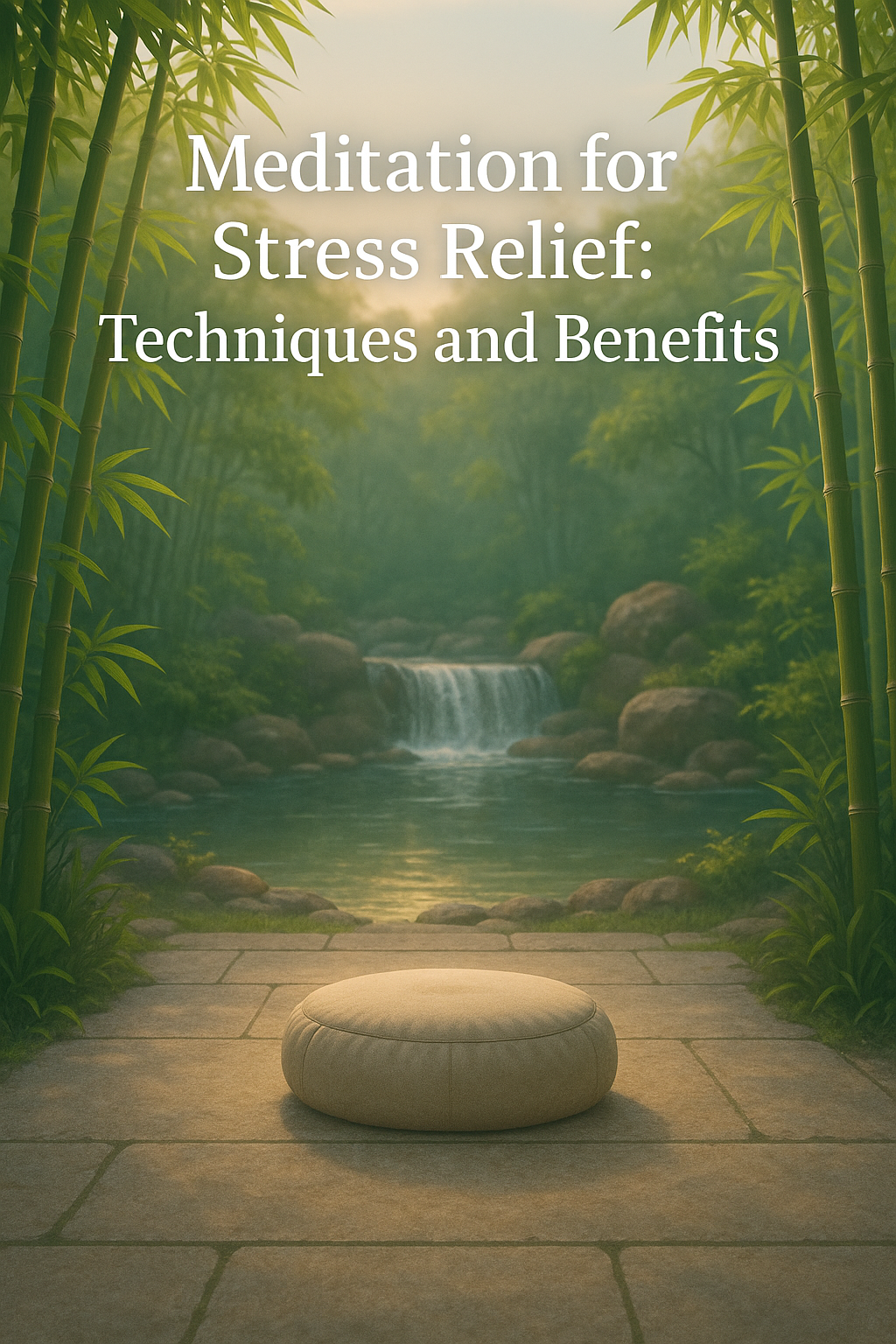Meditation for Stress Relief: Techniques and Benefits
Your heart is racing. Your shoulders are tense. That familiar knot in your stomach returns as you check your overflowing inbox. Sound familiar? If you’re nodding along, you’re not alone. As a neuroscientist who spent years studying stress responses, I know firsthand how chronic stress can hijack our mental and physical well-being. But here’s the good news: meditation offers a scientifically proven pathway to reclaim your calm.
When I first encountered meditation as a stress management tool, I was skeptical. How could simply sitting quietly combat the very real pressures of deadlines, financial worries, and personal challenges? Yet after diving into the research—and experiencing the benefits myself—I discovered that meditation doesn’t just help us feel better temporarily. It fundamentally rewires our brain’s response to stress.
In this comprehensive guide, I’ll share evidence-based meditation techniques that can transform your relationship with stress, backed by cutting-edge neuroscience research and practical strategies you can implement today.
Understanding Stress and Its Effects
Before we explore how meditation combats stress, let’s understand what we’re up against. Stress isn’t just “in your head”—it triggers a cascade of physiological responses that can impact every system in your body.
The Science of Stress
When you perceive a threat (whether it’s a growling dog or a demanding email from your boss), your body activates the sympathetic nervous system, triggering the “fight-or-flight” response. This leads to:
- Increased heart rate and blood pressure
- Elevated cortisol and adrenaline levels
- Suppressed immune function
- Disrupted digestion
- Impaired cognitive function
While this response was crucial for our ancestors facing physical dangers, modern life keeps many of us in a state of chronic stress activation. Research from the American Psychological Association shows that prolonged stress contributes to numerous health problems, including heart disease, diabetes, depression, and anxiety.
Common Sources of Modern Stress
Today’s stress triggers are often psychological rather than physical:
- Work pressure and job insecurity
- Financial concerns
- Relationship challenges
- Information overload
- Social media comparison
- Global events and uncertainty
- Health worries
- Time pressure and overcommitment
These chronic stressors keep our nervous system in a constant state of alert, leading to what researchers call “allostatic load”—the wear and tear on our body from repeated stress activation.
How Meditation Reduces Stress: The Science
Here’s where meditation enters the picture as a powerful antidote to modern stress. Far from being just relaxation, meditation actively counteracts stress through multiple mechanisms:
The Relaxation Response
Dr. Herbert Benson of Harvard Medical School identified the “relaxation response”—the physiological opposite of the stress response. Meditation triggers this response by:
- Decreasing heart rate and blood pressure
- Slowing breathing rate
- Reducing muscle tension
- Lowering stress hormone levels
Research published in PNAS demonstrates that meditation can activate hundreds of genes related to stress regulation and immune function.
Brain Changes That Combat Stress
Neuroimaging studies reveal that regular meditation practice leads to structural and functional brain changes:
- Reduced Amygdala Reactivity: The amygdala, our brain’s “alarm system,” becomes less reactive to stressors. Harvard researchers found decreased amygdala activation after just 8 weeks of mindfulness training.
- Strengthened Prefrontal Cortex: This region, responsible for executive function and emotional regulation, shows increased thickness and activity in meditators, improving our ability to manage stress responses.
- Enhanced Neuroplasticity: Meditation promotes the brain’s ability to form new neural connections, helping us develop healthier stress response patterns.
Stress Hormone Regulation
Multiple studies confirm that meditation significantly reduces cortisol levels. Research from UC Davis Health shows that regular meditation practice:
- Lowers baseline cortisol levels
- Reduces cortisol response to acute stress
- Improves recovery from stressful events
- Balances other stress-related hormones like adrenaline and noradrenaline
Effective Meditation Techniques for Stress Relief
Now let’s explore specific techniques proven to reduce stress. I’ve used each of these methods with clients and in my own practice, and they’re accessible for beginners while remaining powerful for experienced practitioners.
1. Mindfulness Meditation for Stress
Mindfulness meditation involves paying attention to the present moment without judgment. This simple practice is remarkably effective for stress reduction.
How to Practice:
- Find a comfortable position
- Focus on your breath or bodily sensations
- When your mind wanders to stressful thoughts, gently return attention to the present
- Practice accepting whatever arises without trying to change it
Why It Works: Mindfulness interrupts the cycle of rumination—repetitive negative thinking that amplifies stress. Studies show it reduces activity in the Default Mode Network, the brain network associated with mind-wandering and self-referential worry.
2. Progressive Muscle Relaxation (PMR)
PMR systematically releases physical tension, which often accompanies psychological stress.
How to Practice:
- Starting with your toes, tense each muscle group for 5 seconds
- Release the tension suddenly
- Notice the feeling of relaxation
- Move progressively up through your body
- End with your facial muscles
Why It Works: PMR directly addresses the physical manifestation of stress. Research published in Frontiers in Psychology shows it effectively reduces cortisol levels and anxiety symptoms.
3. Loving-Kindness Meditation (Metta)
This practice cultivates positive emotions toward yourself and others, counteracting stress-induced negativity.
How to Practice:
- Begin by directing loving wishes toward yourself
- Extend these wishes to loved ones
- Include neutral people
- Eventually include difficult people
- End by sending loving-kindness to all beings
Why It Works: Research indicates that loving-kindness meditation increases positive emotions, social connection, and self-compassion while reducing stress and inflammatory responses.
4. Breath-Focused Techniques
Simple breathing exercises can quickly activate the relaxation response.
4-7-8 Breathing:
- Inhale for 4 counts
- Hold for 7 counts
- Exhale for 8 counts
- Repeat 4-8 cycles
Box Breathing:
- Inhale for 4 counts
- Hold for 4 counts
- Exhale for 4 counts
- Hold for 4 counts
- Repeat
Why It Works: Controlled breathing stimulates the vagus nerve, activating the parasympathetic nervous system and countering stress responses.
Incorporating Meditation into Your Daily Routine
The key to experiencing meditation’s stress-reducing benefits is consistency. Here’s how to build a sustainable practice:
Finding Time for Meditation
“I don’t have time” is the most common barrier I hear. The solution? Start small and link meditation to existing habits:
- Morning Routine: 5 minutes before checking your phone
- Commute Meditation: Practice mindfulness on public transport
- Lunch Break Reset: 10 minutes in your car or a quiet space
- Bedtime Wind-Down: Practice before sleep to process daily stress
Creating a Stress-Free Environment
Your meditation space should support relaxation:
- Choose a quiet, comfortable spot
- Minimize distractions (phone on silent)
- Consider soft lighting or candles
- Add calming elements like plants or peaceful artwork
- Use cushions or supportive chairs for comfort
Leveraging Technology
Modern apps make meditation accessible:
- Headspace: Excellent stress-specific programs
- Calm: Great for sleep and anxiety
- Insight Timer: Free guided meditations
- Ten Percent Happier: Stress course by experts
Success Stories and Research Evidence
The benefits of meditation for stress relief aren’t just theoretical—they’re backed by extensive research and real-world results.
Scientific Research Highlights
A comprehensive review in Psychosomatic Medicine analyzed 47 trials with 3,515 participants, finding that meditation programs significantly reduced anxiety, depression, and stress-related symptoms.
| Study Focus | Key Findings | Stress Reduction |
|---|---|---|
| Workplace Stress | 8-week mindfulness program | 28% reduction in perceived stress |
| Healthcare Workers | Daily meditation practice | 32% lower burnout rates |
| Students | Exam period meditation | 40% less test anxiety |
| Chronic Pain Patients | Mindfulness-based stress reduction | 35% improvement in stress coping |
Physiological Benefits
Research from Mayo Clinic confirms meditation’s physical stress-reduction benefits:
- Decreased blood pressure
- Improved immune function
- Better sleep quality
- Reduced inflammation markers
- Lower risk of stress-related diseases
Practical Tips for Stress-Relief Meditation
Start Your Practice Today
- Begin with just 5 minutes daily
- Choose one technique that resonates
- Practice at the same time each day
- Be patient with yourself
- Track your stress levels to notice improvements
Common Obstacles and Solutions
“My mind is too busy” Remember: meditation isn’t about stopping thoughts but changing your relationship to them. Each time you notice your mind wandering and return to your focus, you’re building mental resilience.
“I don’t feel different” Benefits often accumulate subtly. Keep a stress journal to track changes in your reactions to daily stressors.
“I can’t sit still” Try walking meditation or shorter sessions. Even 2-3 minutes of focused breathing can reduce stress.
Emergency Stress-Relief Techniques
For acute stress moments:
- Three Deep Breaths: Immediately activates the relaxation response
- 5-4-3-2-1 Grounding: Name 5 things you see, 4 you can touch, 3 you hear, 2 you smell, 1 you taste
- Mini Body Scan: Quick 60-second awareness of physical sensations
The Long-Term Benefits of Regular Practice
Consistent meditation practice creates lasting changes in how you respond to stress:
- Emotional Resilience: Better ability to bounce back from setbacks
- Improved Relationships: Less reactive in conflicts
- Enhanced Work Performance: Better focus under pressure
- Physical Health: Reduced risk of stress-related illnesses
- Life Satisfaction: Greater overall well-being and contentment
Conclusion: Your Path to a Calmer Life
Stress may be an inevitable part of modern life, but suffering from it isn’t. Meditation offers a scientifically validated path to not just manage stress but transform your relationship with life’s challenges.
As someone who has studied the neuroscience of stress and witnessed countless individuals reclaim their peace through meditation, I can assure you: this practice works. Whether you choose mindfulness, loving-kindness, or simple breathing techniques, consistent practice will rewire your stress response system.
Remember, you don’t need to meditate perfectly to experience benefits. Start where you are, with just a few minutes daily. Your stressed-out nervous system will thank you, and you might just discover a calmer, more resilient version of yourself in the process. Remember Meditation for stress relief is supposed to relieve your stress so just understand you don’t need to be perfect, just start and remember we are always expanding our resources and content visit our home page
Ready to begin your journey to a less stressed life? Choose one technique from this guide and commit to practicing it for just five minutes daily this week. Your future, calmer self is just a few breaths away.
What meditation technique has helped you most with stress? Share your experiences in the comments below, and let’s support each other on this journey to greater calm and resilience.







1 comment
This post is so great! I’ll be trying these tips and reporting back!